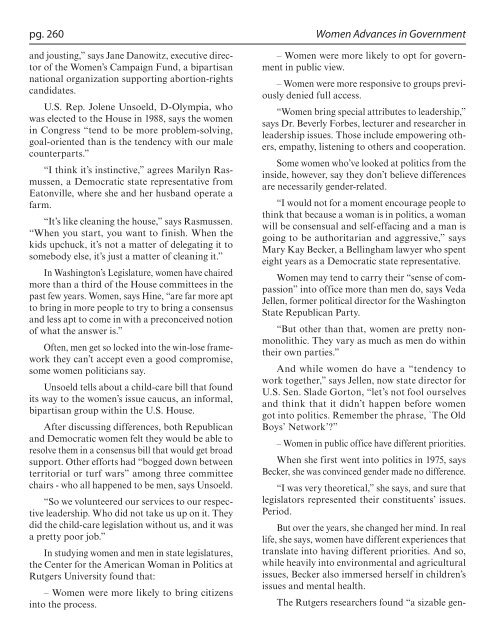Helen Sommers: An Oral History
Helen Sommers: An Oral History
Helen Sommers: An Oral History
Create successful ePaper yourself
Turn your PDF publications into a flip-book with our unique Google optimized e-Paper software.
pg. 260 Women Advances in Government<br />
and jousting,” says Jane Danowitz, executive director<br />
of the Women’s Campaign Fund, a bipartisan<br />
national organization supporting abortion-rights<br />
candidates.<br />
U.S. Rep. Jolene Unsoeld, D-Olympia, who<br />
was elected to the House in 1988, says the women<br />
in Congress “tend to be more problem-solving,<br />
goal-oriented than is the tendency with our male<br />
counterparts.”<br />
“I think it’s instinctive,” agrees Marilyn Rasmussen,<br />
a Democratic state representative from<br />
Eatonville, where she and her husband operate a<br />
farm.<br />
“It’s like cleaning the house,” says Rasmussen.<br />
“When you start, you want to finish. When the<br />
kids upchuck, it’s not a matter of delegating it to<br />
somebody else, it’s just a matter of cleaning it.”<br />
In Washington’s Legislature, women have chaired<br />
more than a third of the House committees in the<br />
past few years. Women, says Hine, “are far more apt<br />
to bring in more people to try to bring a consensus<br />
and less apt to come in with a preconceived notion<br />
of what the answer is.”<br />
Often, men get so locked into the win-lose framework<br />
they can’t accept even a good compromise,<br />
some women politicians say.<br />
Unsoeld tells about a child-care bill that found<br />
its way to the women’s issue caucus, an informal,<br />
bipartisan group within the U.S. House.<br />
After discussing differences, both Republican<br />
and Democratic women felt they would be able to<br />
resolve them in a consensus bill that would get broad<br />
support. Other efforts had “bogged down between<br />
territorial or turf wars” among three committee<br />
chairs - who all happened to be men, says Unsoeld.<br />
“So we volunteered our services to our respective<br />
leadership. Who did not take us up on it. They<br />
did the child-care legislation without us, and it was<br />
a pretty poor job.”<br />
In studying women and men in state legislatures,<br />
the Center for the American Woman in Politics at<br />
Rutgers University found that:<br />
– Women were more likely to bring citizens<br />
into the process.<br />
– Women were more likely to opt for government<br />
in public view.<br />
– Women were more responsive to groups previously<br />
denied full access.<br />
“Women bring special attributes to leadership,”<br />
says Dr. Beverly Forbes, lecturer and researcher in<br />
leadership issues. Those include empowering others,<br />
empathy, listening to others and cooperation.<br />
Some women who’ve looked at politics from the<br />
inside, however, say they don’t believe differences<br />
are necessarily gender-related.<br />
“I would not for a moment encourage people to<br />
think that because a woman is in politics, a woman<br />
will be consensual and self-effacing and a man is<br />
going to be authoritarian and aggressive,” says<br />
Mary Kay Becker, a Bellingham lawyer who spent<br />
eight years as a Democratic state representative.<br />
Women may tend to carry their “sense of compassion”<br />
into office more than men do, says Veda<br />
Jellen, former political director for the Washington<br />
State Republican Party.<br />
“But other than that, women are pretty nonmonolithic.<br />
They vary as much as men do within<br />
their own parties.”<br />
<strong>An</strong>d while women do have a “tendency to<br />
work together,” says Jellen, now state director for<br />
U.S. Sen. Slade Gorton, “let’s not fool ourselves<br />
and think that it didn’t happen before women<br />
got into politics. Remember the phrase, `The Old<br />
Boys’ Network’?”<br />
– Women in public office have different priorities.<br />
When she first went into politics in 1975, says<br />
Becker, she was convinced gender made no difference.<br />
“I was very theoretical,” she says, and sure that<br />
legislators represented their constituents’ issues.<br />
Period.<br />
But over the years, she changed her mind. In real<br />
life, she says, women have different experiences that<br />
translate into having different priorities. <strong>An</strong>d so,<br />
while heavily into environmental and agricultural<br />
issues, Becker also immersed herself in children’s<br />
issues and mental health.<br />
The Rutgers researchers found “a sizable gen
















